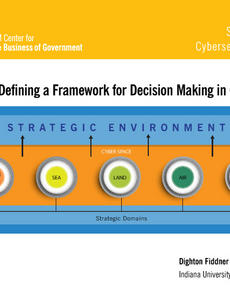
New Report from the IBM Center: A Framework to Improve Management of Cyberspace

This report is the product of a group of experts, which was convened by the Department of Computer Science at the Indiana University of Pennsylvania (IUP). IUP brought together an interdisciplinary panel of experts in national security, international relations, foreign policy, information system network and security, public policy, and computer science. These experts participated in two collaborative roundtable meetings during the first six months of 2014. The report presents results from the roundtable discussions, as well as other research conducted by the author. Professor Fiddner’s report is intended to provide cyberspace decision makers with a comprehensive and clear description of cyberspace, which can facilitate decisionmaking about how to manage cyberspace programs to improve government’s effectiveness in this critically important area. The report is premised on the contention that tmproving the definition of cyberspace will improve current understanding of how to address cyber issues strategically, as well as how, when, and what tools decision makers should use to respond to cyber events. Professor Fiddner begins with a general discussion of the need to define cyberspace as a tool to help government manage cyber activity more effectively, both directly and across traditional strategic domains of land, sea, air, and space. The report then offers a taxonomy of the range of cyber threats for which effective responses can be framed, using context created by the definition of cyberspace and determining consideration of cyberspace as a separate strategic domain. Finally, the report concludes with a series of recommendations for leaders to consider in developing a greater understanding of cyberspace, including the value of a broad and commonly accepted definition to help guide management actions in cyberspace. The panel of experts found that a better definition of cyberspace was needed, as well as an increased understanding of the concept of “strategic domains.” Recent events continue to demonstrate the importance of effective management for cyberspace. We hope that cyberspace decision makers will find the work of the Roundtable led by Professor Fiddner to be helpful as they manage and make decisions about cyberspace programs in the years ahead.



